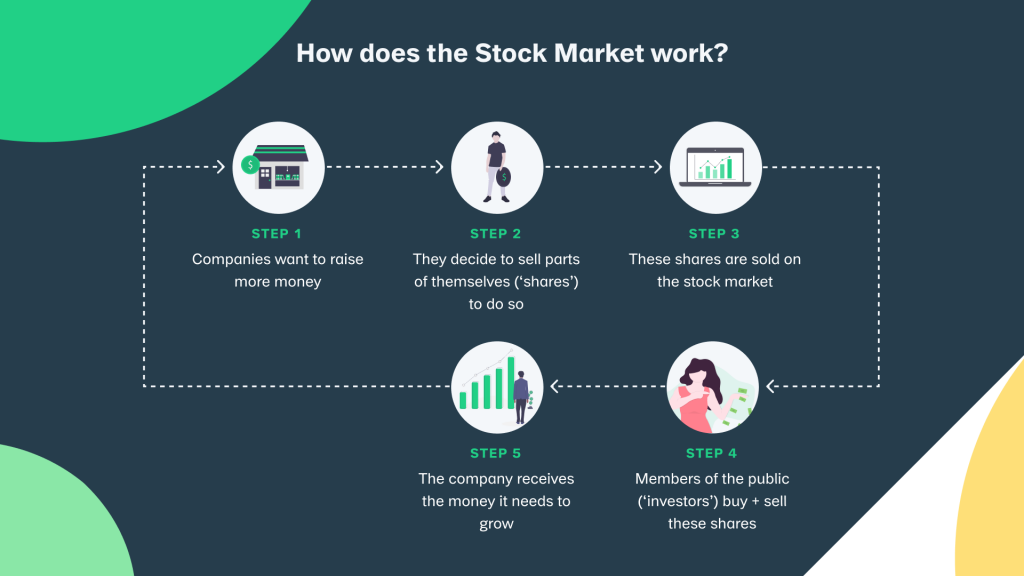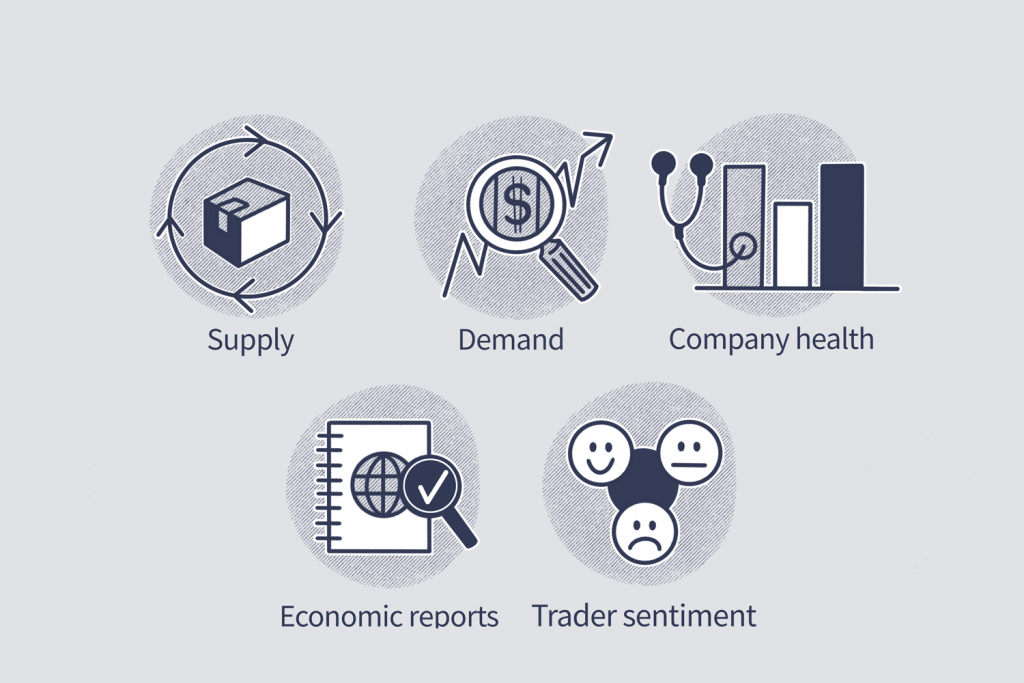Key Takeaways
- Stocks are a type of investment that allows you to buy a piece of a publicly traded company.
- There are multiple reasons why people invest in stocks such as easy ROI, portfolio diversification etc.
- Company performance, market conditions, investor sentiment and technical factors are key determinants that impact the price of a stock.
- Setting a stop loss, taking regular profits and using limit orders are vital for successful day trading
- Following key steps regarding how to invest in stocks is essential for you to ensure you maximize your chances of generating substantial gains.
Investing in stocks can be a great way to earn a return on your investment and build your wealth over time. However, it is important to understand how the stock market works before you start investing.
This guide will teach you the basics of how to invest in stocks, including how to select a brokerage account and research investments. Let us deep dive into a few fundamental concepts before discussion how to invest in stocks.
What are stocks?
Stocks are a type of investment that allows you to buy a piece of a publicly traded company. When you own stocks, you become a shareholder of that company and have the potential to earn dividends and capital gains.

Dividends are payments made by companies to their shareholders, typically quarterly or annually. Capital gains occur when you sell your shares for more than you paid for them.
How does the stock market work?
The stock market is where stocks are bought and sold. It is a collection of markets where stocks and other securities are traded between investors. The stock market is divided into two main exchanges: the New York Stock Exchange (NYSE) and the Nasdaq. The NYSE is the largest stock exchange in the world, with a market capitalization of over $30 trillion. The Nasdaq is the second-largest stock exchange, with a market capitalization of over $12 trillion.

Why invest in stocks?
There are a few reasons why you might want to consider stock investing:
- To earn a return on your investment: Stocks have the potential to generate both dividends and capital gains. Over time, these earnings can add up and help you build your wealth.
- To diversify your investment portfolio: Adding stocks to your portfolio can help diversify your investments and reduce your overall risk.
- To participate in the growth of a company: When you are investing in stocks, you are investing in a company and its future growth. This can be a rewarding experience if the company is successful.

Investing in stocks can be a great way to earn a return on your investment and build your wealth over time. However, it is important to remember that stocks are a riskier investment than other types of investments, such as bonds or cash. This means that you could lose money if the stock market declines or if the company whose stock you own goes bankrupt.
Because of this, it is important to consider your overall financial goals and risk tolerance when deciding whether or not to engage in stock trading. For most people, investing in stocks is a wise decision, but you need to do ample preparation and maybe even consult a reliable financial advisor.
What kinds of stocks exist in the market?
There are two types of stocks: common stocks and preferred stocks.
Common stocks are the most popular type of stock and they typically entitle the shareholder to vote on corporate matters, receive dividends, and participate in the company’s growth.
Preferred stocks typically do not have voting rights, but they have a higher claim on a company’s assets and earnings than common shareholders. Preferred shareholders typically receive dividends before common shareholders, and they may also have the ability to convert their shares into common stock.
Common vs preferred stocks – Which one is better?
There is no one-size-fits-all answer to this question – it depends on your investment goals and risk tolerance.
If you are looking for income, preferred stocks may be a better choice as they typically offer higher dividend payments than common stocks. If you are looking for capital gains, common stocks may be a better choice as they typically have more upside potential than preferred stocks.
Basic difference between penny stocks and regular stocks
Penny stocks are low-priced securities that trade for less than $5 per share. They are considered to be risky investments, as they are often subject to manipulation and fraud.
Regular stocks are shares of a company that trade on an exchange at a price that is set by the market. They are considered to be less risky investments than penny stocks, as they are more heavily regulated.
Famous exchanges operating in the global stock market
- The New York Stock Exchange (NYSE): The NYSE is the largest stock exchange in the world, with a market capitalization of over $23 trillion. It is located in New York City and was founded in 1792.
- The Nasdaq: The Nasdaq is the second-largest stock exchange in the world, with a market capitalization of over $12 trillion. It is located in New York City and was founded in 1971.
- The Tokyo Stock Exchange (TSE): The TSE is the third-largest stock exchange in the world, with a market capitalization of over $6 trillion. It is located in Tokyo, Japan and was founded in 1878.

- The London Stock Exchange (LSE): The LSE is the fourth-largest stock exchange in the world, with a market capitalization of over $4 trillion. It is located in London, England and was founded in 1801.
- The Hong Kong Stock Exchange (HKEX): The HKEX is the fifth-largest stock exchange in the world, with a market capitalization of over $3 trillion. It is located in Hong Kong and was founded in 1891.
- Toronto Stock Exchange (TSX): The TSX is the seventh-largest stock exchange in the world, with a market capitalization of over $2 trillion. It is located in Toronto, Canada and was founded in 1861.
How to invest in stocks – Key steps
Here are the key steps you should consider when entering the stock market:
- Select a brokerage account: In order to perform stock investing, you will need to open a brokerage account. This is an account that allows you to buy and sell investments, including stocks. There are many different brokerages to choose from, so it is important to compare options before selecting one.
- Research investments: Next, it is time to start researching investments. When researching stocks, you will want to consider factors such as the company’s financial stability, its history of dividend payments, and its overall growth potential.
- Decide how much to invest: It is important to think about how much you are willing to invest You will want to consider your overall financial goals and risk tolerance when making this decision.
- Begin investing: Once you have decided how much to invest, you can begin buying stocks. You can buy stocks through a brokerage or directly from a company.
- Monitor your investments: Once you have invested in individual stocks, it is important to monitor your investments by maintaining a watchlist. This includes tracking the performance of your stocks and being aware of any changes in the company’s financial situation.
How to research a stock before investing in it
There are many aspects to consider when choosing individual stocks to invest in, but some of the most important include:
- The financial stability of the company
- The company’s growth potential
- The company’s dividend history
- The company’s valuation
- Analyst recommendations

Major factors influencing the price of a stock explained
- Company performance: Poor company performance is one of the main reasons why stock prices go down. This can be due to a variety of factors, such as weak sales, poor earnings, and bad news about the company.
- The overall market: The stock market is influenced by a variety of factors, including the overall health of the economy, interest rates, and geopolitical events. When the overall market is doing well, stocks tend to do well too. However, when there is market volatility, stock prices may fall.

- Investor sentiment: Investor sentiment is another important factor that can influence stock prices. If investors are bullish on a particular stock (meaning they believe the stock will go up in price), this can cause the stock price to rise. However, if investors are bearish on a stock (meaning they believe the stock will go down in price), this can cause the stock price to fall.
- Supply and demand: The laws of supply and demand also play a role in determining stock prices. When there is high demand for a particular stock, the price of the stock will go up. However, when there is low demand for a particular stock, the price of the stock will go down.
- Technical factors: Technical factors can also influence stock prices. These factors include things like chart patterns and moving averages. Technical analysis can be used to predict how individual stocks might move in the future based on past data.
How often should you review your stocks?
It’s important to review your stocks on a regular basis, at least once per quarter. This will allow you to see how your investments are performing and make changes if necessary. If you don’t have the time to review your stocks yourself, you can always hire a financial advisor to do it for you.
Common strategies for investing in stocks
There are many different strategies for investing in stocks. Some common strategies include:
- Value investing: Value investors look for stocks that they believe are undervalued by the market. They typically invest in companies with strong fundamentals and a history of profitability.
- Growth investing: Growth investors look for stocks that they believe have the potential to appreciate in value at a faster rate than the overall market. They typically invest in young companies with high growth potential.
- Income investing: Income investors look for stocks that pay high dividends. They typically invest in well-established companies with a history of paying out dividends.

- Speculative investing: Speculative investors look for stocks that they believe are undervalued and have the potential to appreciate in value. They typically invest in companies with high risk and high potential reward.
- ESG Investing: To maximise returns over time, ESG investors think about how a company’s operations and policies will affect the world around it. The thinking is that organisations with a strong focus on corporate responsibility and environmental consciousness would do better. In many ways, ESG investing is the same as other “socially responsible” or “impact” or “ethical” investment approaches. However, the goal of these strategies is to limit investment. The focus of ESG investment is on how these same factors influence financial outcomes. Individuals may either put their money into ESG funds or utilise ESG grading services to make investment decisions on their own. These tactics may or may not work, because it’s still early days for the field. Before committing to a fund or ratings service, it’s smart to do your homework.
- Multi Asset Investing: In the long run, stock investments often provide the biggest returns. However, this also makes them the most volatile kind of investment. Combining several types of investments may lead to higher returns overall. Investment portfolio volatility and risk may be reduced by increasing the number of asset types represented. Some examples of asset classes that might be included in a highly diversified portfolio include equities, bonds, cash, commodities, real estate, hedge funds, and private equity. You may further diversify your stock portfolio by using different investment strategies.
General risks associated with investing in stocks
There are many risks associated with investing in stocks. Some of the more common risks include:
- Market risk: Market risk is the risk that the stock market will decline in value. This can be due to economic recession, political unrest, or other factors.
- Company risk: Company risk is the risk that a specific company will perform poorly. This can be due to poor management, declining sales, or other factors.
- Industry risk: Industry risk is the risk that an entire industry will perform poorly. This can be due to changing technology, economic recession, or other factors.

- Country risk: Country risk is the risk that a country’s stock market will decline in value. This can be due to political unrest, economic recession, or other factors.
- Currency risk: Currency risk is the risk that a currency will depreciate in value. This can be due to economic conditions, political instability, or other factors.
- Inflation risk: Inflation risk is the risk that the purchasing power of a currency will decline. This can be due to economic conditions, political instability, or other factors.
Mistakes beginners make when investing in stocks
Some common mistakes that people make in stock market investing:
- Investing too much money in one stock: When investing in stocks, you should always diversify your portfolio. Don’t put all of your eggs in one basket.
- Failing to do proper research: Before investing in a stock, you should always do your research. This includes reading the company’s financial statements, understanding the business model, and analyzing the competitive landscape.

- Chasing hot stocks: Just because a stock is doing well doesn’t mean you should invest in it. You should only invest in a stock if you believe in the long-term prospects of the company.
- Investing based on emotion: When making investment decisions, you should always focus on facts and logic, not emotions. Don’t let greed or fear dictate your decisions.
Key terms associated with investing in stocks
Some common terms associated with stock market investing include:
- Dividend: A dividend is a distribution of a portion of a company’s earnings to shareholders. Dividends are typically paid out quarterly.
- Stock split: A stock split is when a company divides its shares into multiple pieces. This allows more investors to buy the stock and can increase the price of the stock.
- Bull market: A bull market is when the stock market is in an overall uptrend. This is typically associated with economic growth and rising corporate profits.
- Bear market: A bear market is when the stock market is in an overall downtrend. This is typically associated with economic recession and falling corporate profits.
- Blue chip stocks: Blue chip stocks are stocks of well-established companies with a history of profitability. These stocks are considered to be less risky than other stocks.
Difference between stocks, mutual funds and exchange traded funds
Stocks, mutual funds and exchange traded funds are all types of investments.
- Stocks are a type of investment that represents ownership in a company. When you buy stocks, you become a shareholder in the company and have the potential to earn dividends and capital gains. Within market hours, it may be purchased or sold at any moment.

- Mutual funds are a type of investment that pools money from many different investors and invests it in a variety of securities, such as stocks and bonds. Mutual funds offer diversification and professional management. They may only be purchased or sold at the end of the day.
- An Exchange traded fund is a type of investment that is similar to a mutual fund, but trades on an exchange like a stock. Exchange traded funds offer diversification and flexibility. It may be purchased or sold at any time during market hours
How you can learn more about investing in stocks
If you are interested in learning more about investing in stocks, there are a few resources that can help:
- Online courses: There are many online courses that can teach you the basics of stock investing. These courses can be a great way to learn about how to choose stocks, how to monitor your investments, and how to make informed investment decisions.

- Books: There are many books about investing in stocks that can provide you with valuable information. A few popular titles include The Intelligent Investor by Benjamin Graham and One Up On Wall Street by Peter Lynch.
- Financial advisors: If you want more personalized guidance, you can speak to a financial advisor. Financial advisors can help you develop a stock investing strategy and provide practical investment advice that meets your specific goals and risk tolerance.
What is a brokerage account?
A brokerage account is an account that allows you to buy and sell securities, such as stocks. When opening one, you will need to deposit money into the account in order to start buying stocks.
There are many different types of brokerage accounts, but the two most common are taxable and tax-advantaged accounts. Taxable accounts include traditional accounts, whereas tax-advantaged accounts include Roth IRAs and 401(k)s.
Why you need a brokerage
There are a few reasons why you might need a brokerage:
- You want to buy stocks: If you want to buy stocks, you will need a brokerage account. This is because stocks can only be bought through brokerages.
- You want to sell stocks: If you own stocks and you want to sell them, you will also need a brokerage. This is because stocks can only be sold through brokerages.
- You want to trade options or invest in stock mutual funds: If you want to trade options/stock mutual funds, you will need a brokerage that offers this service. Not all brokerages offer option trading, so it is important to check before opening an account.
What to look for in a brokerage
There are a few things you should look for when you are choosing a brokerage:
- Commission structure: When you buy or sell stocks, you will have to pay a commission to the brokerage. The commission is how the brokerage makes money. Some brokerages charge a flat fee per trade, while others charge a percentage of the trade value. Make sure you understand how the brokerage you are considering charges commissions before opening an account.
- Account minimums: Some brokerages require high minimum deposits in order to open an account. If you don’t have a lot of money to invest, make sure the brokerage you are considering has low account minimums.
- Investment options: Make sure the brokerage you are considering offers the investment options you are interested in. For example, if you want to trade options, make sure the brokerage offers this service.
- Research tools: A good brokerage will offer research tools that can help you make informed investment decisions. Make sure the brokerage you are considering offers the research tools you need.
- Customer service: A good brokerage will offer excellent customer service. This is important because you may need to contact customer service with questions or problems at some point. Make sure the brokerage you are considering has good customer service.
How to open a brokerage account
Opening a brokerage account is relatively simple. Just follow these steps:
- Choose a broker: There are many different brokerages to choose from. You will need to decide which one is right for you based on the factors we discussed earlier.
- Research the broker: Once you have chosen a broker, research the broker to make sure it is reputable and offers the services you need. You can do this by reading online reviews and checking out the broker’s website.
- Open an account: Once you have chosen a broker and researched the broker, you can open an account by following the instructions on the broker’s website.
- Deposit money: After your account is open, you will need to deposit money into the account in order to start buying stocks. You can do this by transferring money from your bank account to your brokerage account.
- Start investing: Once you have deposited money into your account, you can start investing in individual stocks, mutual funds, and other investments.
Now that you know how to open a brokerage account, let’s take a look at how to buy stocks.
Online brokerage account
An online brokerage account is a type of account that can be opened and managed entirely online. Online brokerage accounts are convenient because they allow you to buy and sell stocks without having to go through a human broker.

There are many different online brokers to choose from, so it’s important to compare the fees and features of each one before opening an account. Some common features to look for include:
- No commission fees: Some online brokers don’t charge any commission fees, which means you can buy and sell individual stocks without having to pay any additional fees.
- Low minimum deposit requirements: Some online brokers have low minimum deposit requirements, which means you can open an account with a small amount of money.
- Powerful trading platforms: Some online brokers have powerful trading platforms that allow you to trade stocks and other securities with ease.
Frequently Asked Questions
What is the minimum amount of money I need to start investing in stocks?
There is no minimum amount of money required to start investing in stocks. However, you will need enough money to cover the cost of the shares you want to purchase. For example, if you want to buy 100 shares of a stock that costs $10 per share, you will need at least $1,000.
Can I lose all of my money if I invest in stocks?
It is possible to lose all of your money if you invest in stocks. This can happen if the stock market declines or if the company whose stock you own goes bankrupt. To reduce the risk of losing money, you can diversify your portfolio by investing in a variety of different stocks, bonds, and other investment products. You can also seek professional guidance from a financial advisor.
What is the best way to learn about investing in stocks?
There is no one-size-fits-all answer to this question. The best way to learn about investing in stocks depends on your learning style and how much time you have to dedicate to learning. If you want a more hands-on approach, you can take an online course or participate in a stock simulator game. If you want a more passive approach, you can read books or listen to podcasts about investing. You can also seek professional guidance from a financial advisor.
What is an exchange traded fund?
An exchange traded fund (ETF) is a type of investment that is similar to a mutual fund, but trades on an exchange like a stock. ETFs offer diversification and flexibility, which makes them an attractive option for many investors.
What are the risks of investing in stocks?
The risks of investing in stocks include the possibility of losing money, as well as the potential for fraud. To reduce the risk of losing money, you can diversify your portfolio by investing in a variety of different stocks, bonds, and other investment products. You can also seek professional guidance from a financial advisor. To reduce the risk of fraud, you should only invest in stocks that are listed on a major exchange, such as the New York Stock Exchange or the Nasdaq. You should also research the company before investing to make sure it is a legitimate business.
Conclusion
Investing in stocks can be a great way to earn a return on your investment and build your wealth over time. However, it is important to remember that stocks are a riskier investment than other types of investments, such as bonds or cash. This means that you could lose money if the stock market declines or if the company whose stock you own goes bankrupt.
Because of this, it is important to consider your overall financial goals and risk tolerance when deciding whether or not to invest in stocks. For most people, investing in stocks is a wise decision, but you need to do ample preparation and maybe even consult a reliable financial advisor.
Hopefully, this article has given you a better understanding of how to invest in stocks and what to expect as a beginner investor.




 By:
By:





